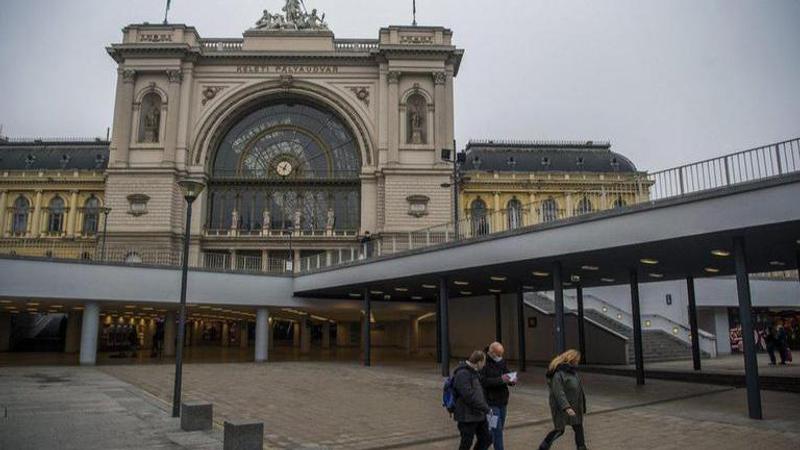Published 22:43 IST, November 11th 2020
Hungary reverses course to sharply tighten pandemic rules
Hungary’s government has imposed its strictest pandemic measures so far amid a quickly worsening situation, drastically changing course after weeks of lax restrictions and an optimistic outlook from Prime Minister Viktor Orban.

Hungary’s government has imposed its strictest pandemic measures so far amid a quickly worsening situation, drastically changing course after weeks of lax restrictions and an optimistic outlook from Prime Minister Viktor Orban.
The new restrictions include an 8 p.m. to 5 a.m. curfew, restaurants and bars being limited to takeout and home delivery, mandatory mask-wearing in public areas, a 10-person ceiling on family gatherings, remote learning for high school and university students and limits on sports events. They kicked in early Wednesday and will remain in effect for at least 30 days.
Zoltan Kiss-Bakos, owner of three Budapest bars, said similar restrictions imposed in the spring caused a 70% drop in revenue.
“We can’t make up for losses like these out of our pockets for long, it won’t work. We don’t plan to fire anyone, but it’s a definite possibility we’ll have to send the business into hibernation,” he said Wednesday.
The measures came as a sudden reversal from weeks of business-as-usual and a pandemic policy designed to protect the economy from the shock of lockdown. In mid-September, when daily COVID-19 deaths were still in the single digits, Orban indicated the government would shape its policy based on the number of deaths, not of infections.
But recent weeks have brought sharp increases in both, eclipsing spring numbers. Last week was the deadliest of the pandemic with 619 deaths, and the number of coronavirus patients being treated in hospitals went above 6,000 for the first time.
In announcing the lockdown, Orban said that if the number of infections continued to grow at that rate, “then our doctors ... and our hospitals (won’t be able to) cope with the burden.”
On Saturday, the government ordered hospitals to suspend elective surgeries and expanded the number of hospitals designated for treating coronavirus patients. Hungary purchased thousands of ventilators from China in the spring and summer, but experts warn that there is a lack of qualified staff to operate them.
While Hungary closed its borders to most foreign travelers in early September, bars and restaurants remained open and 16,000 people attended a soccer match in Budapest in late October. In contrast, other central or eastern European countries imposed restrictions like those now in effect in Hungary weeks earlier. In early November, neighboring Slovakia administered 3 million tests in a single weekend, while Hungary’s daily number of tests hovered around 18,000.
Still, the government has promised the restrictions will be strictly implemented: Orban announced Wednesday that the Hungarian army would help police enforce the curfew, and businesses may be shuttered if they ignore mask-wearing rules.
Daily COVID-19 deaths jumped above 100 for the third time Wednesday, bringing the total to 2,697 — with about half recorded in the past two weeks. Nearly 123,000 confirmed infections have been reported so far in the country of nearly 10 million.
Members of Hungary’s opposition have criticized the measures as being too little, too late.
Budapest mayor Gergely Karacsony, a member of the opposition Dialogue party, wrote on Facebook Wednesday: “The scandalously late government decree still does not say a word about one of the most important elements in dealing with the epidemic, expanding test capacities.”
The government’s own pandemic advisors have also urged an increase in testing capacity. They had also long pressed for stricter measures, warning that otherwise matters could spiral out of control. In September Orban said it was “a matter of taste” whether experts’ grim projections were to be believed.
Despite political tensions between Orban’s Fidesz party and the opposition, the bill approving the new restrictions was passed with opposition support. It extends a state of emergency for 90 days, and gives Orban’s government powers to issue decrees, suspend enforcement of certain laws and take other extraordinary measures without parliamentary approval.
That mirrors a controversial bill passed in March which gave the government the power to rule by decree with no end date. The 90-day limit in the new bill helped win the support of opposition politicians, who urged the government to use its new powers only to address the pandemic and its economic fallout.
“The support is there, we just hope they will use it well,” nationalist Jobbik party lawmaker Laszlo Gyorgy Lukacs said.
Updated 22:43 IST, November 11th 2020




